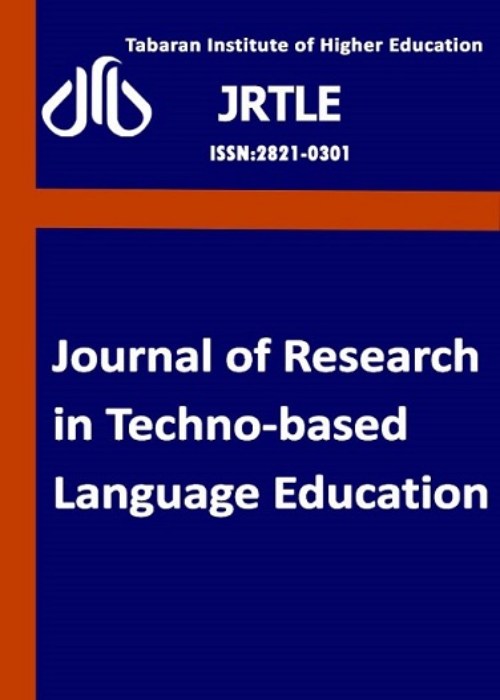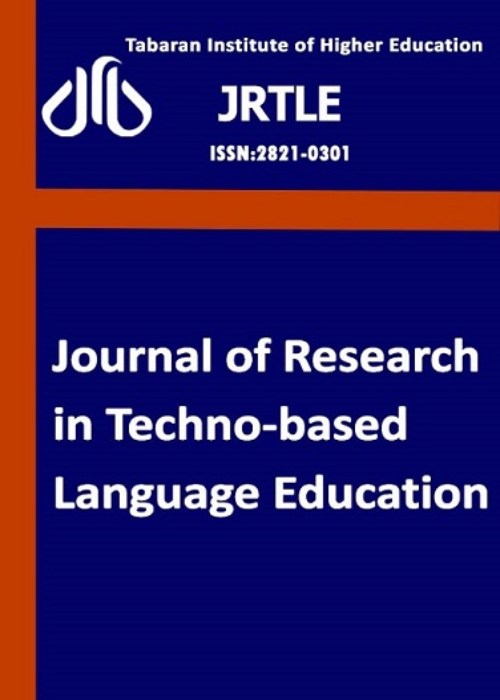فهرست مطالب

Journal of Research in Techno-based Language Education
Volume:3 Issue: 1, Mar 2023
- تاریخ انتشار: 1402/02/30
- تعداد عناوین: 3
-
Pages 1-11In today’s innovative world, it is not right to consider learners as passive receivers of information since they are more possibly qualified to advance. They are certainly more actively involved, interested, self-directed, and autonomous. Likewise, a flipped classroom helps students to be more active participants in an interactive learning environment. Thus, the current study aimed to describe the benefits of implementing online flipped classrooms on EFL female students’ grammar achievement. The study was conducted as a pretest-posttest quasi-experimental research design at one of the Iranian high schools. Fifty EFL female students who were studying humanistic in grade 12th were requested to take part in this study. After analyzing the data using an independent-samples t-test, the findings indicated that the experimental group had better performance than the control group. Additionally, the results of the open-ended question showed that the majority of students had a positive perception of implementing online flipped classrooms. The implications of the study for EFL students and teachers are discussed.Keywords: English language, Grammar Achievement, Online Flipped Classroom
-
Pages 12-17Online teaching ultimately encourages language teaching to use established and best practices to provide this teaching modality in empirically validated ways. The use of the media in classrooms leads students to learn about the subject more creatively and objectively. The study investigated the relationship between teachers' media literacy and their attitude toward online teaching. Three hundred eighty-three males and females EFL teachers participated in the present study. All participants had a Master of Arts in TEFL. The participations were selected through convenience sampling. Then, the researcher used the Pearson correlation to investigate the correlation between teachers’ media literacy and their attitude toward online teaching. The results showed that there was a positive significant relationship between teachers’ media literacy and their attitude towards online teaching.Keywords: Media Literacy Education, online teaching, Teachers’ Attitude towards Online Teaching, Teachers’ Media Literacy
-
Pages 18-35Translating taboo words is one of the challenging tasks that translators face during subtitling and dubbing movies. The translation of taboo words should be handled carefully since they may violate the norms of the target society. In this regard, the translators use different strategies to find an equivalent in the target language. This study tried to identify the strategies used by Iranian translators in dubbing and subtitling the F*k words as taboos in American English- drama crime television series based on Davoodi’s (2009) model. Thus, this was a corpus-based study that has a quantitative method with a descriptive comparative approach. The corpus of this study was limited to F*k words found in the TV series called Big Little Lies season one. This TV series was selected as the corpus of this research because this series movie was incredibly more suggestive and popular in recent decades and targeted a wide range of audiences and adults. Thus, 80 F*k words were identified for further analysis based on Sharifi and Darchinian's (2009) model. Descriptive statistics were used to determine frequencies and percentages of the applied strategies in the Persian subtitled and dubbed of the F*k words. The findings showed that Substitution, and Euphemism were the first and second used strategies by Iranian translators for dubbing and subtitling the F*k words, respectively. Additionally, the results of the Chi-square test revealed that there was not a significant difference between Iranian translators’ strategies for subtitling and dubbing F*k words. The results of the present study can be beneficial for Iranian subtitlers, dubbers, and translation students in the subtitling and dubbing of F*k words as taboos in crime drama movies from English into Persian.Keywords: dubbing, F*k Words, Subtitling, Taboo words, translation strategies


